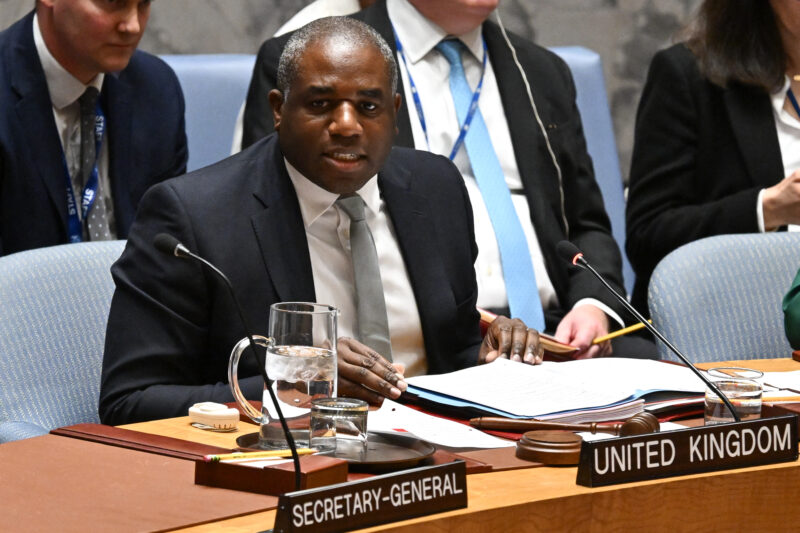Iran deal remains on ice, senators say following classified briefing
Sen. Tim Kaine described the briefing as a ‘status update’ with no major new developments

Anna Moneymaker/Getty Images
Sen. Tim Kaine (D-VA) steps out to call for one of his aides during a meeting with fellow Democratic senators in the basement of the U.S. Capitol Building on December 15, 2021, in Washington, DC.
U.S. policy toward Iran seems to be largely stagnant, senators said as they emerged from a classified briefing on Iran on Tuesday — including on the long-stalled nuclear talks with Tehran.
“I would characterize it as a status update, rather than any news,” Sen. Tim Kaine (D-VA) told reporters, adding that administration officials did not communicate any significant developments. “It was a thorough status update.”
The Virginia senator said that there had been no progress toward either rejoining the Joint Comprehensive Plan of Action or a more limited nuclear deal because “the combination of Iranian support for Russia in Ukraine, the abysmal Iranian human rights record as well as continued attacks on U.S. and allied positions in Iraq and Syria make that a nonstarter right now.”
Sen. Josh Hawley (R-MO) said that a potential “less-for-less” nuclear deal, which has been floated in recent months, was not discussed in the portion of the briefing he attended, and described the deal as moribund.
“They were exploring reentering the JCPOA or whatever, that’s not going to happen, which is good,” he said. “It looks to me like it’s just a sort of treading-water situation.”
Hawley added that his “sense is the Biden administration is not really pressing the Europeans to crack down in any significant way” by implementing further sanctions on Tehran.
More broadly, Hawley described the briefing as largely devoid of substance.
“They really don’t have much to say on the topic. I didn’t think it was a really useful briefing. I don’t know if we really have a coordinated strategy. If there is one, I didn’t hear it,” Hawley said. “We didn’t learn anything new or remotely classified.”
Sen. Robert Menendez (D-NJ), the chair of the Senate Foreign Relations Committee and a prominent Democratic critic of negotiations with Iran, said that officials laid out a strategy for preventing a nuclear-armed Iran without nuclear negotiations.
“I think it was a very solid briefing,” Menendez said. “There’s always more we could do, and I think there are options they’re considering… They are committed to ensuring that Iran does not get a nuclear weapon.”
Sen. Jim Risch (R-ID), the ranking member of the Senate Foreign Relations Committee, said in a statement that the administration is “no closer to a more comprehensive Iran policy” than it was six months ago when President Joe Biden said in leaked remarks that the JCPOA is dead.
“Strategic ambiguity on Iran policy only serves to embolden the regime and push our partners closer to China,” Risch said. “As Iran continues to illegally seize vessels, target Americans in the region, and support its terror proxies and the Russian invasion of Ukraine, Americans deserve a policy that is more than a failed nuclear negotiation.”
Sen. Ed Markey (D-MA) told JI that a nuclear deal remains “the preferred option but it’s up to the Iranians.” He said he could not confirm whether there are talks currently occurring.
Speaking broadly on foreign policy, Sen. John Kennedy (R-LA) said it has “been clear to me for a while” that there is a developing global axis among Iran, Russia and China that seeks to “dominate” its respective regions of the world. He said he did not think the administration has a clear strategy for breaking up this alliance, including Iran’s arms transfers to Russia for its war in Ukraine.
“The truth of the matter is that while the sanctions have slowed Iran, and to some extent Russia, those sanctions have not stopped them,” Kennedy said. “But when you ask the administration, ‘What is your plan, given that the sanctions have not stopped them? What is your plan in addition to the sanctions?’ you are met with either silence or BS.”
Sen. Ted Cruz (R-TX) said he did not hear a strategy to stop the weapons flow, and “to the contrary they intend to keep the Iranians’ weapons flow going because they want an Iranian nuclear deal more than a win in Ukraine.”
Kaine said that the recent normalization deal between Iran and Saudi Arabia brokered by China is “significant” and was discussed during the briefing.
Kaine added that the tensions between Tehran and Riyadh “make it very bad in the region for everybody” and said the deal could have “real positive benefits,” but that it’s “unfortunate” that China, rather than the U.S., brokered the agreement.













































































